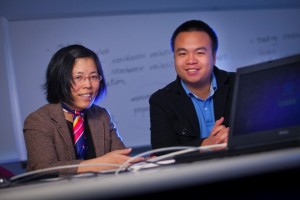Helping students appreciate her field’s beauty and practical applications is one of the most rewarding aspects of teaching at Lafayette for Qin Lu, associate professor of mathematics.
She often includes students in her research. Mentoring them outside the classroom not only enhances their skills, she says, it keeps her on her toes as an educator.
“Their questions challenge me to think more deeply,” she says. “Having undergraduate students assist with my research keeps me working hard.”

Professor Qin Lu works with Linh Nguyen ’14 on finance research.
One of Lu’s primary research interests is financial mathematics. Her current work is a continuation of a project she began as part of the College’s Research Experience for Undergraduates (REU), an intensive, eight-week summer program in which students investigate unsolved problems in mathematics. Economics major Linh Nguyen ’14 (Hanoi, Vietnam), Joshua Cape, a student at Rhodes College, and William Gamber, a student at Pomona College, are assisting with the work. Donald Chambers, Hanson/KPMG Professor of Finance, and Jeff Liebner, assistant professor of mathematics, joined the project in the fall.
Lu and her research team are studying the rate of return, a method economists use to track the performance of various financial instruments. To do like comparisons, she explains, economists usually attach an associated risk to the rate of return that describes the return’s volatility.
The team is using the Monte Carlo method (a computational algorithm) to investigate the distributional properties of the risk-adjusted measures of return implied by three different option price models: Black-Scholes, Heston, and Bates. While these ratios have been well-researched in empirical studies of historical data, little work has been done to better understand the statistical properties of these measures through various option price models.
Undergraduate research can be a pivotal experience in shaping students’ future plans, and Lu loves playing a role in that process. For students planning to enter the financial industry immediately after graduation, collaborative research with faculty might steer them toward a Ph.D. program and vice versa.
“Research needs passion and perseverance,” says Lu. “Undergraduate students often don’t clearly know what they want to do after graduation. I hope I can help them. The research experience can help them get into prestigious Ph.D. programs as well as land a good job in the industry. Several of my previous REU students accepted jobs with the Federal Reserve. To hear students comment that I helped change their lives is my best reward as a teacher.”
In the courses she teaches, Lu always strives to convey why she loves math.
“In lower-level courses, my goal is to help students realize how important mathematics is, to make sure they have the quantitative skills they need and encourage them that they can do math,” she says. “In higher-level courses, my goal is to help students see the beauty of mathematics, to challenge them to model real life using math.”
This summer, Lu will spend six weeks in China as part of the Summer China Program, teaching multivariate calculus and linear algebra at its Shanghai campus. She joins an impressive list of international faculty, including those from Harvard, Yale, Penn, Carnegie Mellon, Purdue, and University of Southern California. Lu believes teaching at a highly selective liberal arts college like Lafayette was a significant factor in her selection for the program.

1 Comment
Although much has been hyped in terms of Black/Merton and Scholes over the last forty years the most recent financial crash must have shown clearly the folly of blind acceptance of any such modelling results versus reality. How could so many people in banking and finance, insurance, government, construction, rating and broking has such unwavering faith and be so misled. Black and Scholes lacks the ultimate ingredient: standing back and taking a moment to consider the forest hidden in plain view, i.e., daring to challenge and to apply a touch of commonsense. Heresy!
Comments are closed.